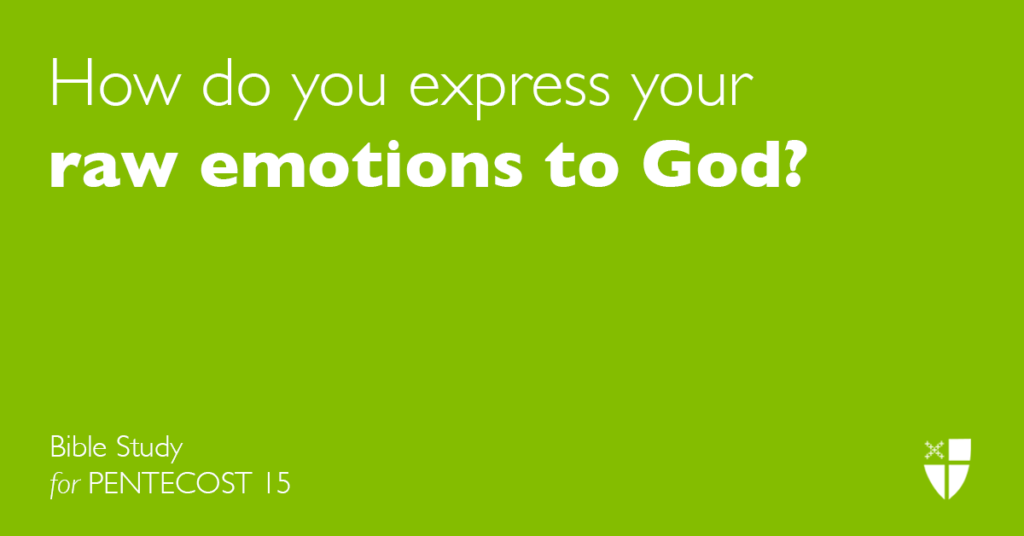This page is available in: Español
Bible Study: Proper 20 (C) – 2019
September 22, 2019
Jeremiah 8:18-9:1

There are times when we feel the weight of life on our shoulders. Jeremiah laments, “My joy is gone, grief is upon me, my heart is sick” (8:18, NRSV). In this passage, Jeremiah is mourning not only the upcoming destruction of Jerusalem but also the exile of his people. The world is crumbling around him; the people of Israel have turned away from God and judgment is coming. “I am hurt, I mourn” (8:21), the prophet writes, not just as a statement of sorrow but of resignation for the people of his nation. However, as desperate and resigned as this passage is, God is not some apathetic observer; God is actively engaged. And while Jerusalem’s destruction and Israel’s exile will be a time of struggle, pain, and despair, there is hope. God is there, holding God’s people in God’s hand while they await and finally endure the coming suffering. People of faith tend to be sympathetic towards the hurt in this world. We strive for justice, peace, and love, but when those virtues seem absent, we too lament. But, as we not only speak out against injustice, strife, and fear but also work towards addressing those issues, we have to understand that sin does not get the final word. God does. Because of that, we should always live, regardless of the circumstances, lives of hope.
- In times of lament, how do you hold on to hope in God?
- What is the role of the prophetic voice in our culture today?
Psalm 79:1-9
This psalm, like many of the psalms, is very vivid. There is little to be left to the imagination regarding the writer’s mental, emotional, and spiritual states. The writer is upset at the fact that the Temple, the place where heaven and earth mingle, has been “profaned” (v. 1, BCP), Jerusalem has been destroyed, and a significant portion of the population has been massacred. It is no wonder why the author asks God to “pour out your wrath upon the heathen who have not known you” (v. 6). Admittedly, it can be uncomfortable for us to face the fact that a cry for vengeance is in our scriptures, scriptures that call for us to be compassionate, forgiving, and completely self-giving. However, what the psalms show us is how to give voice to our pain—how we too can offer up those raw feelings to God. The worst thing we can do is allow those raw emotions to fester, mutate, and finally corrupt our being. We offer those feelings up to God so that God can hold them and help us deal with them before they become destructive words or actions.
- How do you express your raw emotions to God?
- Do you tend to clean up your thoughts and emotions before offering them to God?
1 Timothy 2:1-7
Prayer is an essential aspect of the Christian life. In this selection from 1 Timothy, the author of this letter urges those in Ephesus to hold regular prayer meetings. Prayers offered at these meetings, however, are not just offered for those present, but also for those in authority. Prayer is not something reserved for a select few, but something to be offered to all people regardless of who they are. We pray to nurture an environment of peace. As we nurture peace within ourselves and desire peace and goodwill for all humanity, we live into our calling as Christians, as followers of the enfleshed God of peace, Jesus.
- What does prayer feel like when you pray for those you may not like or agree with?
- When you pray, does it feel like you’re nourishing peace?
Luke 16:1-13
This parable is a confusing one. It appears as if it’s an ends-justify-the-means parable. It would be incorrect to say that the manager was not self-serving in this parable. He knows that he is not suited for any other work (v. 3). Verse 4 gives us a hint of what this parable is getting at: the manager wants to be charitable because he understands that the debtors will show him charity when he loses his job. However, his master unexpectedly shows charity to the manager for his shrewd manner of collecting the debts.
The manager gained nothing financially from settling the debts but regained the trust of his master. By slashing the debts, the manager was, essentially, slashing his commission from the price. But what he regained was his master’s confidence. The manager showed charity to the debtors and the master showed charity to the manager.
This expectation-based form of charity is only the first step towards the charity of the Kingdom of God. Charity in the Kingdom of God is a one-way street—charity that expects nothing in return. What we’re seeing here is the first imperfect stage in anticipation for the kingdom of “eternal homes” (v. 9) that are part of the Kingdom of God. And while this manner of shrewdly acquiring and distributing wealth gets the job done, the true expectation is complete charity for everybody regardless of the circumstance. This is what serving God and God alone looks like.
- What does a perfectly charitable society look like?
- How do you bring charity to your life?
This page is available in: Español
Don’t forget to subscribe to the Sermons That Work podcast to hear this sermon and more on your favorite podcasting app! Recordings are released the Thursday before each liturgical date.
Receive Free Weekly Sermons That Work Resources!
This page is available in: Español


